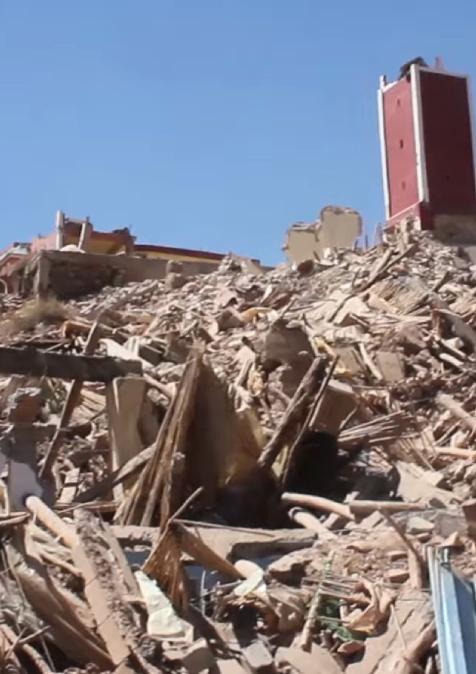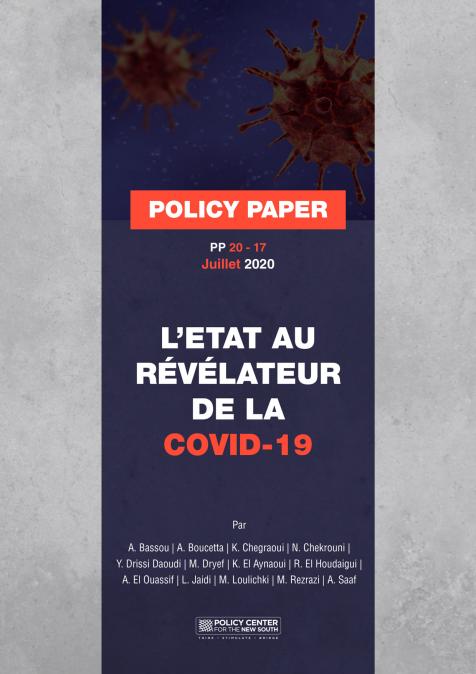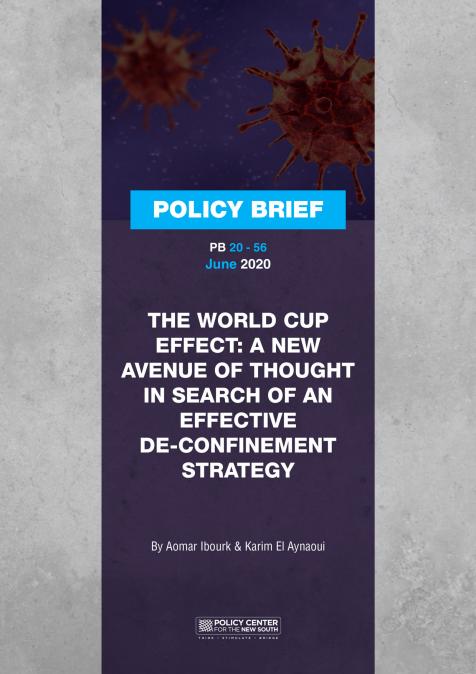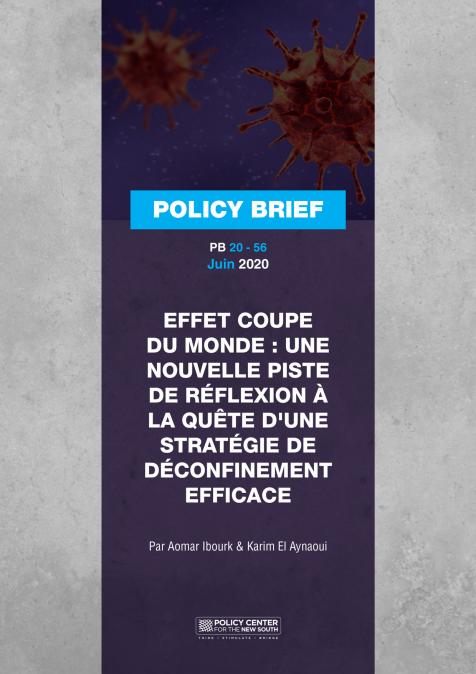Publications /
Opinion
An unprecedented year
Each figure hides a life, a dream destroyed, a future to live. Shadowed by each number are families in agony, flows of tears and unanswered questions. On September 8 the clock had shown 23:11 Marrakesh time, and then Morocco cried, united in mourning, remembering 3,000 noble brothers and sisters, who turned into dark figures, victims of a horrendous earthquake which affected 6.6 million people. A national heartbeat later, war-torn Libya joined the pain, more destruction - and more figures to envision the size of human losses. Here they were suffocated by rubble, there water swept them away, for example a town named Derna, in the eastern region of Libya. Entire neighborhoods were carried into death and destruction by storms and water, and there was no time for prayer. Poor Libya, “at least 2,000 dead and 10,000 believed missing …”, reported CNN (September 12, 2023), as “catastrophic flooding breaks dam and sweeps away homes” (some 300 kilometers east of Benghazi). The rain that swept across several cities in Libya’s north-east, observed CNN, is” the result of a very strong low-pressure system that brought catastrophic flooding to Greece last week and moved into the Mediterranean before developing into a tropical-like cyclone, known as a medicane.” The storm comes in an “unprecedented year of climate disasters and record-breaking weather extremes, from devastating wildfires to oppressive heat”. “An end-of-the-world atmosphere”, said the Nouvelle Tribune (August 11, 2023, Une ambiance de fin du monde) in a video, “an apocalyptic sandstorm hits Marrakesh”. Dark, silent, the raging sandstorm had palm trees dancing a slow waltz and then the rock’n roll of nature, too familiar to Marrakesh, which that day reported 47°C, dry heat competing with the traditional hammams in the old town. “Master, the tempest is raging”, intoned some worshippers in the catholic church in the Gueliz quarter of Marrakesh, possibly loud enough to comfort the Muslim devotees in the Mosque across the street.
The feared apocalyptic menace moved on, without provoking horror, as witnessed on the Greek island of Rhodes, where an estimated 19,000 tourists and natives scrambled for safety from wildfires in July, during which 82 fires were burning across Greece (NASA Observatory, July 19, 2023), 64 igniting because of the extreme heat and drought on one day, July 24. Fires are not unusual in Greece, but, as NASA scientists predicted, “heat stoked fire weather is projected to become more common as the planet warms”.
If any proof is still needed that climate change is not a conspiracy, but a dramatic threat for generations to come, summer 2023 delivered almost daily instances of drought, flood or fire, nature in distress. Canada announced the worst fires in history. Montevideo, Uruguay suffered its worst drought in 74 years. “Three consecutive years of drought”, wrote The Guardian (July 15, 2023), “have almost emptied the reservoir of fresh water, and to avoid shortages [Uruguay’s] state run water supplier, OSE, has since the beginning of this year been gradually adding brackish water. By early May the mix had reached the maximum level of sodium and chlorides, and now it has doubled those levels, giving the water its repulsive taste, raising questions about potential effects on health». Meanwhile, Hawaii experienced its “largest natural disaster”, according to Josh Green, a trained medical doctor and governor of the U.S. Island State of Hawaii. On Maui, hundreds of natives and tourists were turned into ash, and some of the remains were just blown away, when a heat-stoked fire, aggravated by a passing hurricane, turned the historic town of Lahaina into a human hell, “leaving a trail of death and destruction behind” (CNN, August 14, 2023). Around 2200 structures have been destroyed or damaged, a $6 billion loss has been estimated.
Visiting Earth After the Humans Have Gone
In Beijing, China and its surroundings, cars were overturned by floodwaters, roads turned into wild rivers, when heavy rain hit areas in Beijing’s mountainous western outskirts, Aljazeera reported (August 9, 2023). Floods caused the collapse of 59,000 homes, damaging 150,000 others. Some 15,000 hectares of cropland were flooded. Many roads were damaged, along with 100 bridges. In Italy, the Po river crosses the northern part of the country from Piedmont, where Italy borders Switzerland and France in the Alps, to the Adriatic Sea in the west, near Venice, 652 kilometers in all. Drought “is threatening crops in the valley, where around 40 percent of the country’s food is produced”, stated Nature Italy (July 14, 2022). The nation “must prepare for a future of chronic drought—the water crisis in Northern Italy is the sign of a long-term problem that is already altering the ecosystem”, experts warn. The entire region along the river is at risk. The poet Guido Ceronetti once wrote, “you need to understand the Po to understand Italy”, but now says author Tobias Jones, as northern Italy faces its worse drought in 70 years, “the river is also a prism through which to glimpse onto the country’s ecological emergency” (The Guardian, July 10, 2022). “Since you barely see anyone all day, it feels as if you are visiting earth after the humans have gone”, observed Jones.
The Italian lakes that depend on the Po for replenishment are also at extremely low levels: 31 percent for Lake Garda, which is now approaching the lowest level since 1953, as is the famous Lake Como, filled with only 23 percent—a mounting tragedy for tourism, at a scale hardly imaginable for locals. On October 15 of this year, two days prior Lake Garda measured its water height as 79.70 cm, Como at 83.50 cm, soon low enough to cross the lake walking “Italy is very exposed to climate change, especially the Alpine regions”, noted Stefano Fenoglio, professor of zoology and hydrobiology at the University of Turin, “and facing this crisis should be a priority. Drought is treated like an acute episode, but it’s becoming a chronic one now. Some of the proposed solutions, such as creating more reservoirs, will only work so far”. The scientist suggested in an interview with Nature Journal (July 14, 2022): “we can no longer have very demanding crops, inefficient distribution and irrigation systems. We have to think about a system that uses water more sparingly”.
More drought disasters can be expected: July 2023 has turned into an historic reference, the “hottest month in earth’s history”, as confirmed by the European Union’s climate observatory, the Copernicus Climate Change Service (channelnewsasia, August 8, 2023). Its report paints a grim picture of the planet’s rapidly warming climate. With an increase of 0.72°C above the 1991-2020 average for July, July 2023 surpassed the previous warmest month, July 2019, by 0.33°C. The Deputy Director of the Copernicus Climate Change Service, Samantha Burgess, warned the unprecedented temperature records “have dire consequences for both people and the planet’s exposure to ever more frequent and intense extreme events”. Just imagine ,a headline posted by the “ New York Post” (May 18 ,2023) predicting New York City turning in less than 80 years into “a modern Venice”. Apparently, that was not fake news. By the end of September 2023 this calculation of a scientist turned into reality-- masses of rain transformed the city center, Manhattan , into an urban lake and only white swans were missing for an romantic opera production.
Global warming is expected “to increase the number of water-stressed areas and heighten water stress in already affected regions, subtropical areas such as Australia, the southern United States, and African countries”, observed Claire Klobucista and Kali Robinson of the Council on Foreign Relations ( April 3, 2023). Their report predicted “a more erratic climate is also expected to bring more floods, which can wipe out crops and overwhelm storage systems”.
An undated UNESCO report on water quality (https://en.unesco.org/internationalinitiativeonwaterquality) stated: “Water quality is one of the main challenges that societies will fare during the 21st century… The availability of the world’s scarce water resources is increasingly limited due to the worsening pollution of freshwater resources caused by the disposal of large quantities of insufficiently treated, or untreated, wastewater into rivers, lakes, aquifers, and coastal waters”. The crisis in water pollution “is exerting social and economic pressure everywhere in the world”.
One of the Most Stressed Water Systems in the World
“Morocco is a semi-arid country with erratic rainfall”, explains Isabelle Tsakok in her Policy Paper ‘Short of Water and Under Increasing Pressure to Deliver Food Security: Key Policy Considerations—The Case of the Kingdom of Morocco’, published by the Policy Center for the New South (May 2023). “It is one of the world’s most water-stressed countries (defined as water per capita below 1000m/3 per year) and with climate change, will be even more water stressed in the decades ahead”, she wrote. The Kingdom may share a future with Italy or Spain, struggling to keep its agricultural alive, and thousands of swimming pools filled and golf courses green. From 1960 to 2020, wrote Isabelle Tsakok, “the per-capita availability of renewable water resources, decreased from 2560m3 to about 620m3 per year, fast approaching the absolute water scarcity threshold of 500m/3 per person per year (World Bank 2022)” (p. 5). “In the first half of 2022, Morocco’s economy decelerated sharply due to drought, rising energy prices and the food import bill exacerbated by the Russian invasion of Ukraine in February, and growth slowdown in Morocco’s major export market, the European Union” (pp. 6/7) .
Currently, Moroccan agriculture consumes more than 80% of available water, and despite promises by the government to extend desalination efforts from nine plants presently to 20 by 2030 (North Africa Post, May 17, 2022), water availability will most likely decrease, while non-agricultural demand arising from urbanization and industrialization will likely rise from 60% to 100% in Morocco’s larger cities. Increased temperatures are expected across the entire North African region, which means annual temperatures projected to increase by 1.5°C to 3.5°C by 2050, and possibly by more than 5°C” by the end of the century. “By the 2090s”, wrote Isabelle Tsakok, “temperature is projected to increase by 10% and average precipitation is projected to decrease by 20%, with a 30% reduction for the Saharan region.” (WBG, 2021, p.11).
0.003 Percent
“The global water crisis is an increasingly pressing issue as the world’s population continues to grow, adding by 2050 an estimated 2. 5 billion people to the world’s population, as the UN predicts. 71 percent of the earth is covered in water; however only three percent of water is freshwater, and of that water two thirds is found in groundwater, glaciers and polar ice caps”, wrote E-Environmental Magazine (May 4, 2023). A more depressing figure was published in the previously mentioned UNESCO water management report (https://en.unesco.org), which concluded that “of all freshwater on earth only 0.003 percent was readily accessible to direct human use”. Elon Musk, wealthy enough to finance his own water expedition to Jupiter or Mars, argued in a recent HBO talk show, Real Time with Bill Maher (April 29, 2023), that desalination could be the savior, since there is plenty of water on earth, including, Musk insisted, “below the Sahara”. Maher: “But you can’ drink that”. For the billionaire, water is “not an issue”, because the desalination method is “absurdly cheap”. Musk had a point. Plenty of water is available for nations able to finance the enormous construction and operating costs, with a medium-sized project estimated at about $20 million annually. “43 percent of the world’s desalination capacity is controlled by the Gulf Cooperation Council”, wrote The Guardian (October 7, 2022), including Kuwait, Bahrain, the UAE, and Saudi Arabia. The southern coasts of the Gulf are dotted with more than 300 desalination plants, a supply urgently, and permanently, needed. The United Arab Emirates alone has one of the highest per-capita water consumption rates on earth, its people using about 500 liters a day, 50% more than the global average.







